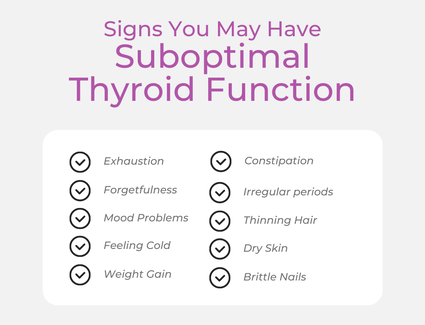|
Signs You May Have Suboptimal Thyroid Function Thyroid hormone is one of the most misunderstood hormones. It’s so misunderstood that as many as 60% of people who have a thyroid issue don’t even know it. Your thyroid gland is a butterfly-shaped organ at the base of your neck. It releases thyroid hormone, which regulates your metabolism, energy levels, brain function, and more. If your thyroid is not working at optimal function, here are some possible signs:
Some people who experience these symptoms end up being diagnosed with hypothyroid. Others struggle with these issues and are told their thyroid labs look normal. That can happen because the normal lab ranges are not necessarily optimal or because not all forms of thyroid hormone have been looked at in the test. 👉 It’s possible to have suboptimal thyroid function even if your routine thyroid labs look “normal.” Women are up to 8 times as likely to develop a thyroid condition as men. If left ignored, it could cause problems during pregnancy or increase your risk of things like heart disease as you age. Root Causes of Suboptimal Thyroid Function How could it be possible to experience thyroid-related problems even when routine labs show that thyroid function is “normal?” Let’s break this down. Here’s how your thyroid works: A hormone called TRH is released from your hypothalamus (deep inside your brain), which triggers TSH release from your pituitary gland (also in your brain). TSH travels through your blood to trigger thyroid hormone production in your thyroid gland (at the base of your neck). Your thyroid gland produces 2 active forms of thyroid hormone that circulate through your body:
Even though your body makes much more T4 than T3, your T3 is about 4 times as powerful and considered an even more active form. Your body can also produce reverse T3 (rT3), which actually blocks thyroid function. The most common screening test for thyroid function is TSH. Even when that falls within the lab’s normal reference range, here are some possible scenarios to explain suboptimal thyroid function:
That’s why—if you are struggling with unexplained exhaustion, brain fog, constipation, dry skin, hair loss, brittle nails, or any other signs of thyroid imbalance—it’s so important to have your doctor run a more comprehensive panel of thyroid tests. Of course, the next question to ask is what could be causing suboptimal thyroid function? Here are just a few of the possible root causes:
In functional medicine, we always aim to understand the root cause of your health concerns. We dig deep to look for patterns and explanations. And most importantly, we want to OPTIMIZE your health—because when you are not feeling your best, it affects every area of your life. Nutrients for Thyroid Health Unexplained fatigue. Brain fog. Moodiness. Weight gain. Hair loss. Brittle nails….all of these can be signs of suboptimal thyroid function. There can be many different factors that can disrupt thyroid function (I shared a post about this earlier this month), but one possibility is insufficient nutrient status. So, let’s take a look at some of the most important nutrients for thyroid health. 1️⃣Tyrosine. L-tyrosine is an amino acid present in many protein-rich foods. Your body can also make it from other amino acids. Tyrosine is a building block required for the synthesis of thyroid hormone. 2️⃣Iodine. Iodine is a trace mineral in seaweed, seafood, and iodized salt. It binds with tyrosine as another essential building block of thyroid hormone. 3️⃣Selenium. Selenium is a trace mineral found in especially high amounts in Brazil nuts. Your thyroid gland concentrates more selenium than any other organ of the body. Selenium acts as an antioxidant and also supports thyroid hormone production. 4️⃣Zinc. Zinc is a mineral found in meats and many other foods. It supports enzymes involved in thyroid hormone production and function. This is not an exhaustive list of nutrients needed for thyroid function. You also need B vitamins, vitamin A, vitamin E, iron, and more. One of the best ways to get the range of nutrients your thyroid needs is through a nutrient-dense diet. Why Stress Disrupts Your Thyroid Do you know what your body does when you experience stress? It produces cortisol. Cortisol is an adrenal hormone that is meant to help your body respond to stressful situations. But...too much and too often can have damaging effects on your thyroid. Here’s why: ➡️Cortisol increases the production of reverse T3 (rT3), which blocks thyroid function. ➡️Cortisol decreases TSH, which is needed to stimulate thyroid hormone production. ➡️Cortisol can indirectly lead to higher levels of TBG, which decreases the amount of free thyroid hormone available for cells. There really is a quite complicated relationship between thyroid health and stress because of the hormones involved with each. But there’s a pretty simple takeaway message here: If you want to support optimal thyroid function, you cannot ignore the effects of stress—and that means anything your body PERCEIVES as stress (including things like under-eating or overexercising!). Here are a handful of things you can do to reduce your stress: 🍏Eat in a way that supports healthy blood sugar balance (you might need to be open to including some carbs!) 👟Exercise the right amount for your body (movement is key but not in excess!) 🧘♂️Take breaks (your body needs rest as much as it needs activity!) 💤Aim for sound sleep (this might mean cutting the glass or wine or social scrolls at night!) |
About Our Blog:Author: Categories:
All
Archives:
November 2022
|
|
Shop Hours:
M - Th: 10-5:30pm, Fri 10-2pm |
Stay Connected with Us!
|


 RSS Feed
RSS Feed


